Second E-newsletter for the Multi-Donor Trust Fund (MDTF) for Integrating Externally-Financed Health Programs
January 17, 2019
Lao PDR builds capacity to manage health sector transition
Lao PDR health officials participated in a 5-day flagship course last month to prepare for tackling health reform, sustainable financing and imple- mentation of Universal Health Coverage (UHC) as their country goes through a period of financing and epidemiological transition.
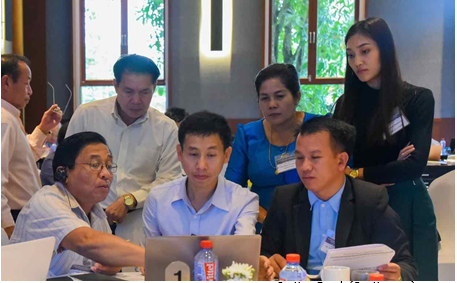
The Flagship Course on Health Sector Reform and Financing in a Transition Context, held in Luang Prabang from December 10-14, 2018, was organized bytheLaoPDR’sMinistryofHealth,theWorldBank, Gavi,GlobalFundandtheGovernmentofAustralia. It was the first “transition-focused” flagshipcourse globally and was also customized for the context of transition in the Lao PDR. The purpose of the course was to enhance the understanding of Lao health officials about reform and financing to support the country through the transition of reducing external financing and increasing domestic resource mobilization forhealth.
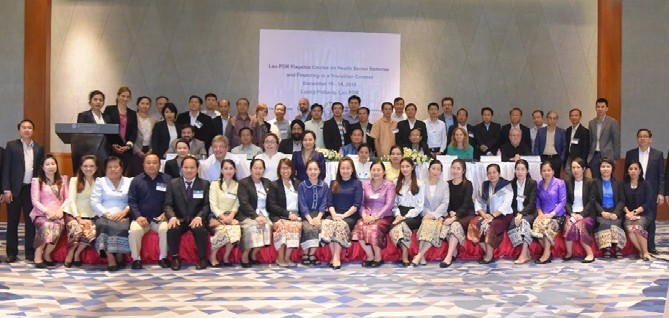
It covered a complete range of knowledge and skills including diagnosis for health sector reform and sustainable financing, introducing the key conceptsofUHC,healthfinancing,servicedelivery, and problem solving. Over 70 participants joining the course also learned about raising revenues and finding additional resources, assessing performance and strategies to improve efficiency and equity of service delivery, and identifying regulatory changes needed for prioritizedreforms.
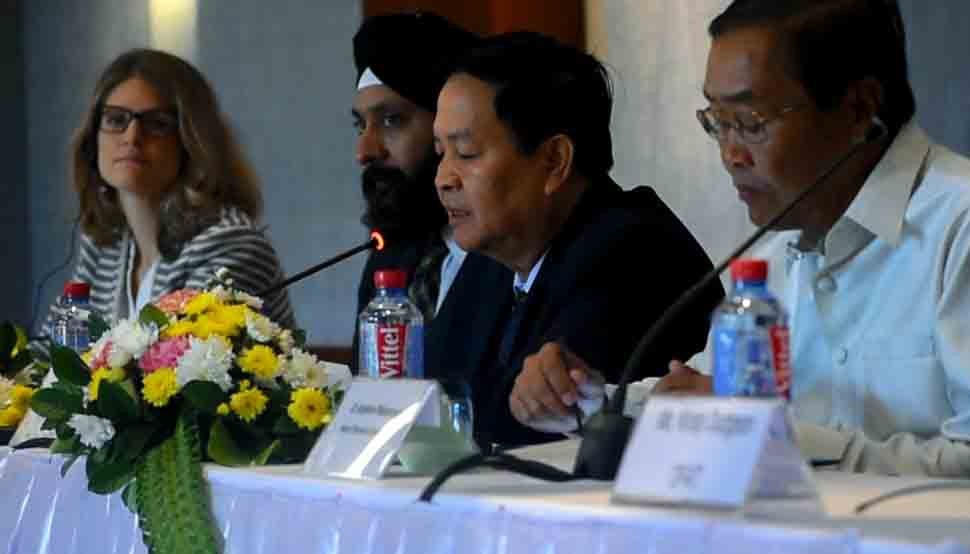
MDTF impacts in focus: health financing improvements across thePacific
WorksupportedbytheMDTFinthePacificin2018 continued to build much clearer understanding of budgetandexpendituretrendsacrosstheSolomon Islands,VanuatuandKiribati,includingforthespe- cificprogramsofmalaria,TB,HIVandimmunization.
In the Solomon Islands, the nominal domestic budget for the malaria program increased 2.5 timesbetween2015and2018,whereasinVanuatu the nominal domestic budget for the HIVprogram in 2018 was 1.5 times higher than in 2016. In both countries, this also translated to an increase of the domestic budget share of the respective pro- gram budgets. Expenditure trends havereportedly improved in some areas, notably for the malaria programs in the Solomon Islands andVanuatu.
Findings and recommendations from the Health FinancingSystemAssessments(HFSAs),completed in2018,wereinvaluableinplanningandbudgeting discussions with the Ministries of Finance and Health.InKiribati,thisisillustratedbyagreaterfocus on strengthening governance and accountability withintheMinistryofHealthandMedicalServices.
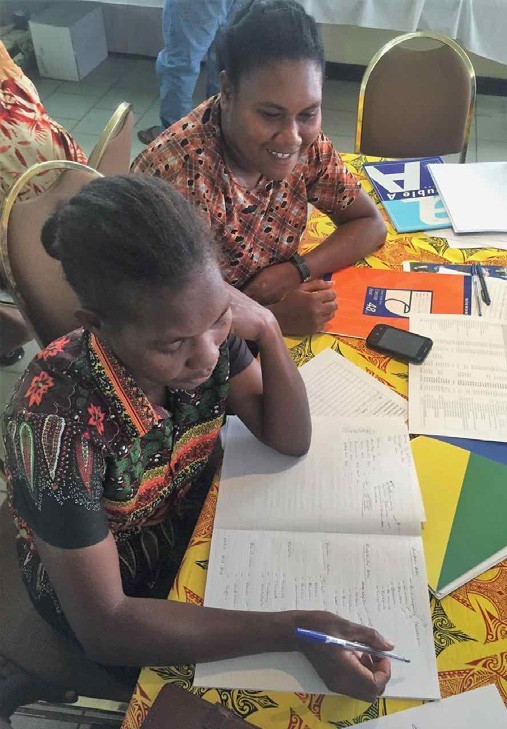
Guadalcanal Zone Managers prepare their 2019 outreach plans and budgets, Solomon Islands
InVanuatu,findingsfromtheHFSAandtheHealth FacilityCostAnalysisandBenchmarkingStudyhave builtgovernmentunderstandingofthecurrentcost of service delivery and existing funding gaps. This resulted in increased allocations for neglected areas such as community health services in the 2019 budget. In the Solomon Islands, improvedfunding transparencyenabledafullreconciliationofGlobal Fund budgets, disbursements and expenditure from 2015 to 2018. It identified significant underspend- ing in the TB/HIV cash on delivery transfers which will be re-programmed for 2019. Improved linkages betweenthemalariaprogramandprovincialhealth divisions is supporting the Ministry of Health’s efforts to get resources to thefrontline
Kiribati sees progress in health sector
Kiribaticontinuestomakegoodprogressinmoni- toringtheperformanceofitshealthsector.Theover- sight provided by the Health Sector Coordination Committee(HSCC)whichmeetsatleastthreetimes a year is an important part of the HealthMinistry’s efforts to improve governance andaccountability.
The HSCC was informed that data for the first threequartersof2018showedTBcasenotification continued to fall in 2018 compared with previous years. However, some of this decrease may reflect a loss in active case detection earlier in the year. Further investigation isunderway.
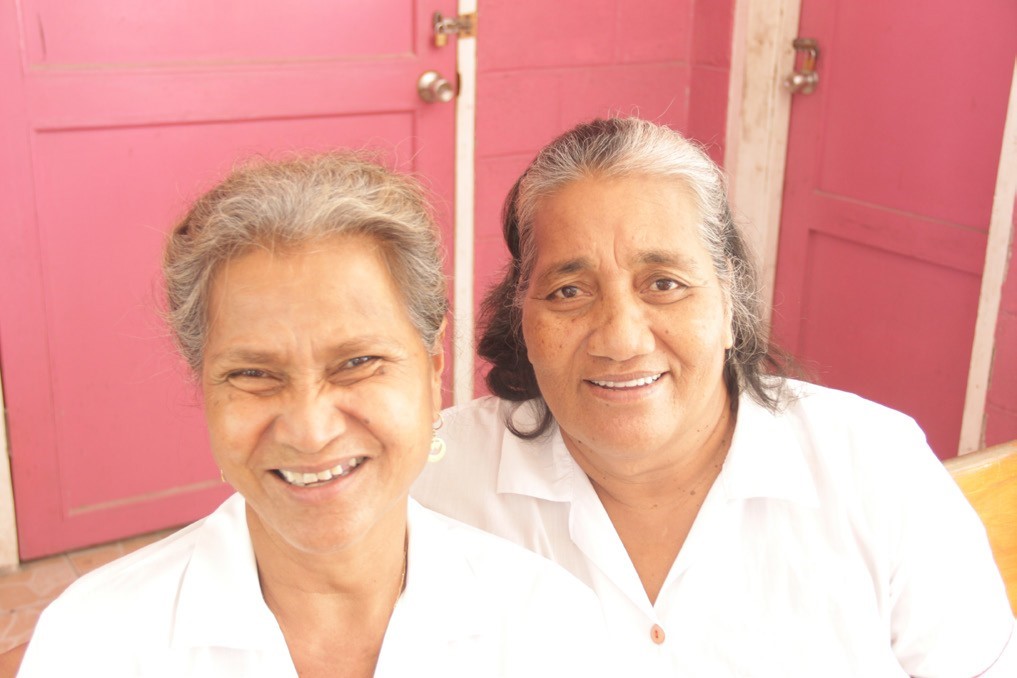
KiribatihasalsojustbegunaHepatitisBTreatment Program,supportedbyHepatitisBFreeandthe WorldHealthOrganization(WHO).Itishopedthat this program, with 69 patients already enrolled for treatment, will enable Kiribati to provide more effective treatment. In addition, Kiribati saw some improvements in its efforts to tackle non-com- municable diseases (NCDs), with diabetes-related amputations decreasing in 2018. This is a trend the Ministry of Health hopes will continue withthe finalization and implementation of the Rehabilita- tion Service Plan in early2019.
Some of the gaps and opportunities for improvement identified through the HSCC will strengthen the tracking of resource management for improved implementation of the TB, leprosy, HIV and immu- nization programs.
Health security is economicsecurity
Sustainable financing is the key to universalhealth security and we must convince our ministries of finance that providing money for “health security” willensurethe“economicsecurity”ofourcountries, a World Bank human development specialist told an international meeting on pandemic prepared- ness.
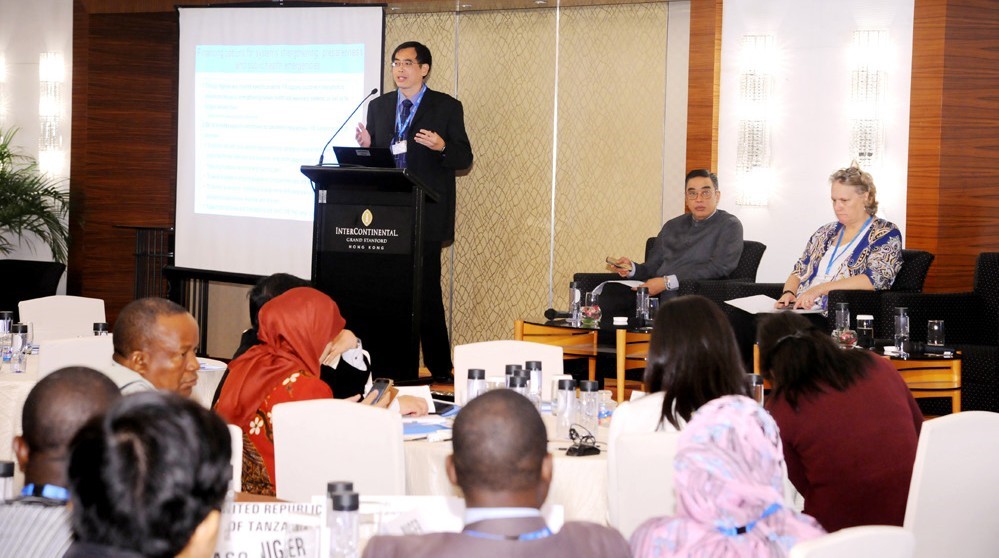
Dr. SutayutOsornprasoppointedtopastoutbreaks of highly infectious diseases such as pandemic influenza,SARS,andEbola,whichnotonlyravaged populations across nations but also wrecked their nationaleconomiesintheprocess,hence the need for countries to invest more inpreparedness.
He was speaking on the World Bank’s support for health security at the Global Technical Consultation onStrengtheningNationalHealthSecuritythrough Pandemic Influenza Preparedness Planning. Over 110 participants from 44 countries attended the meeting which was held in Hong Kong from Dec 10-13,2018.
The World Bank also had a side meeting there with representatives of the World Health Organi- zation HQ, WHO South-East Asia Regional Office (SEARO),andWHOWesternPacificRegionalOffice (WPRO) on the development of economic-related scenariosforasimulationexercise(SimEx),adeliv- erableoftheMDTF’sWindow3.TheWHOandWB representatives agreed to develop new SimEx sce- narios–economicimpactsofpandemics,financing mechanismandfundflowforpreparednessduring peacetime, and financing mechanism and fund flow during response. The joint WB-WHO team expects to finalize SimEx documents in mid-2019, and a simulation exercise with economicscenarios is expected to be delivered in a pilot country before the end of2019.
Mechanisms to collaborate with CSOs in Indonesia
Indonesia’s state budget regulations provide suitablemechanismstoenableCivilSocietyOrgan- isations (CSOs) to participate in the health sector, a series of consultations carried out by the World Bank office in Jakarta and Bappenas (Ministry of National Development Planning) hasfound.
Thefindingoftheconsultations,thelatestofwhich was conducted on December 3, 2018, with the Ministry of Health, the Ministry of Finance and the National Public Procurement Agency (LKPP), negates the current widespread perception that large collaborative schemes between the government and CSOs are not feasible. It waspre- viously thought large funding grant (>US$14,000) processes disadvantagedCSOs.
Many countries rely heavily on donors not only to provide the financing for priority programs, but to contract directly with CSOs to provide services. As countries prepare for eventual transition, it is importantthatcountrieshavemechanismsinplace to continue to engage CSOs. In Indonesia, where Global Fund provides the bulk of the services for key populations through CSOs, the meeting identified two mechanisms deemed suitablefor government-CSO collaboration – swakelola (‘self- managed’ funding) and bantuan pemerintah (cen- tral government grants). Both mechanisms use eligibilitycriteriaandselectionproceduresthatare moresuitedtoCSOs,regardlessofthefundingsize.

Swakelola refers to a state-budget funding mech- anism offering avenues for fund channeling toand collaboration with CSOs. Bantuan pemerintah are grants from the central government that provide a wide range of support for beneficiary groups (including CSOs) engaged in nationalprograms.
Enis Barış begins MDTFrole
Enis Barış has taken over from Toomas Palu as the World Bank’s Global Practice Manager overseeing the strategic direction and overall implementation of MDTF at the Bangkok office of the World Bank. Toomas has moved to Geneva to takeon the role of Adviser on Global Coordination and MDTF ProgramManager.
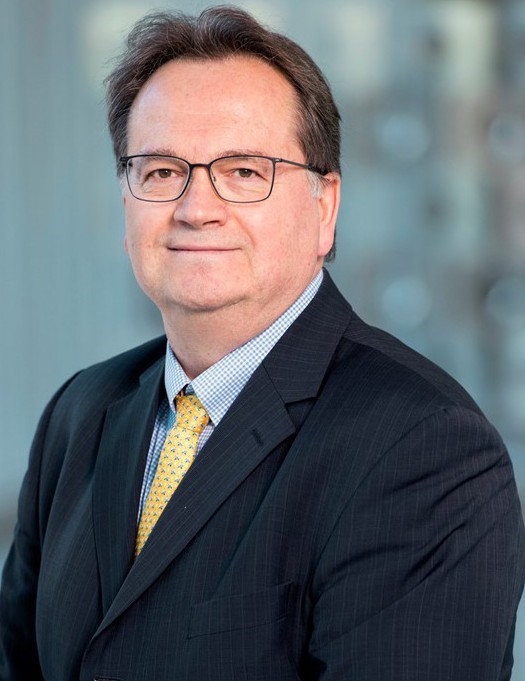
Dr Barış, a physician with graduate degrees in Public Health and Epidemiology, oversees the Bank’s Health Nutrition and Population (HNP) operational portfolio of $1.5 billion, as well as numerous analytical and technical activities, including the MDTF, spanning across 21 countries in the region. He is also a member of the Interagency Coordination Group (IACG) for Antimicrobial Resistance (AMR) set up bytheUNSecretaryGeneralafterthePoliticalDeclarationonAMRmadeattheUN General Assembly in2017.
PreviouslyDrBarışheldseveralleadershippositions,notablyasActingDirector for Human Development and Sector Manager in the Middle East and NorthAfrica. Region of the World Bank, and Practice Manager in Europe and Central Asia with the World Bank Group.
WB’s health security financing initiative well received at SEAOHUN 2018
Participants at the Southeast Asia One HealthUni- versity Network (SEAOHUN) 2018 International Conference expressed strong support for the World Bank’s health security financing initiative and wish to collaboratefurther.
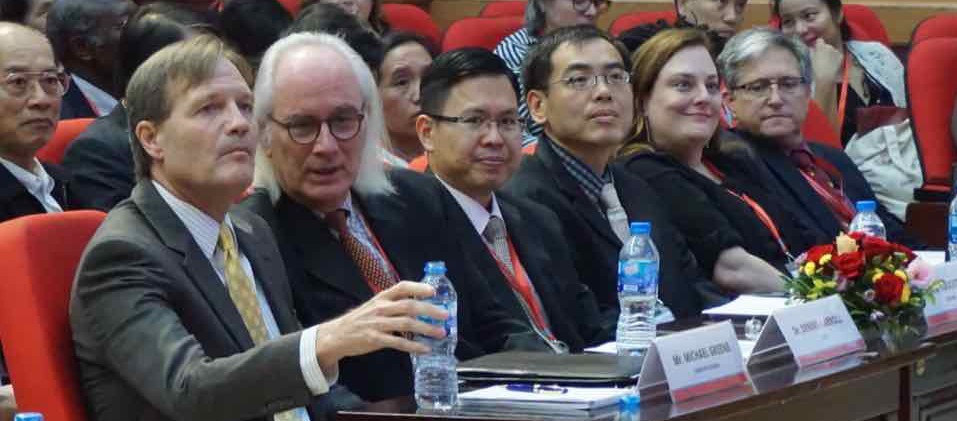
Academics, practitioners and researchers at the con- ference, held in Hanoi from November 12-14, 2018, expressed this view after seeing presentations on the health security financing initiative and the pilot assessment in Vietnam. Senior Human Development Specialist Sutayut Osornprasop presented the World Bank’s initiative to support sustainable financing and resilient systems for health security in East Asia and the Pacific (EAP). And Dr Nguyen Khanh Phuong, Head of Health Economics Department, Vietnam Health Strategy andPolicyInstitute,presentedthefindingsfromthe healthsecurityfinancingassessmentinVietnam.
Many of the approximately 300 participants from all over Southeast Asia told the speakers that the economicsandfinancingaspectsaretheimportant missing pieces from current training on health security and One Health. They expressed strong support for the World Bank’s health security financinginitiativeandwishtocollaborateinareas of capacity building for this work.
Side discussions with Dr Vipat Kuruchittham, Executive Director of SEAOHUN, has led to pro- posed collaboration to develop a flagship courseon health security financing. It will be usedas an in-service short training course fortargeted government officials who work on health securi- ty in five priority countries – Cambodia, Indonesia, Lao PDR, Myanmar, andVietnam.
WB to study use of tax to address NCD burden in Samoa
TheWorldBankisworkingcloselywiththeGovern- ment of Samoa and other development partners to assess the use of excise taxes on unhealthy products as one strategy to address the growing non-communicable disease (NCD)burden.
Thestudywillassesswhatimpactstaxesarehaving on retail prices, consumption behaviors, and gov- ernmentrevenues.

Current data suggests that there is more room for the Government of Samoa to consider further increases to the taxes on selected products to optimizeimpactonconsumptionbehaviors.Efforts wouldalsobetakenonhowtomakehealthyprod- ucts more accessible and affordable. The study is alignedtotheSamoaHealthSystemStrengthening Program and the Samoa Agriculture and Fisheries Productivity and MarketingProject.
This study will also contribute to MDTF transition work. NCD-related taxes help generate morereve- nuesandincreasefiscalspacethatthegovernment can use to increase resources for health. It willalso helpoffsettheuncertaintyandpotentialdecreases in external funding for health from development partners.